Speaker Anglu Farrugia explained to The Malta Independent that there are plans for MPs to use cards which would allow for access certain parts of the building, as an added security measure. “This is supposed to already be in use, however until now the contractor has not yet met his obligations. It is up to the Grand Harbour Regeneration Corporation (GHRC) to take action against that contractor. We were handed over the building from the GHRC subject to everything being in-line”.
“It’s a question of what contract of works were signed between the contractor or sub-contractors. Contractor A was supposed to complete particular services, but would have sub-contracted to one or two other companies, and thus we would have to see the wording of those contracts. We have not yet been given all the contracts, however I have asked for all the contracts”. He said that he will not enter into further contracts, such as maintenance agreements, until he has all the contracts in hand and has seen them.
In an interview, the Speaker described the importance of Parliament having its own home, “irrespective of any criticism made in the past or that is currently evident. The structure is a workable building that bestows prestige where you belong to the highest institution of the land. Before this, we were one of the few, if not the only, Parliament in the European Union that didn’t have our own building”.
He explained that Parliament is still in the phase of adapting to the new chamber. “The Chamber is not based on the House of Commons model, where the Opposition and Government face-off. The seats turn in a semi-circle now, and the members meet thus making it more of a continental style”.
“MPs must also control their behaviour and be more mature,” he explained.
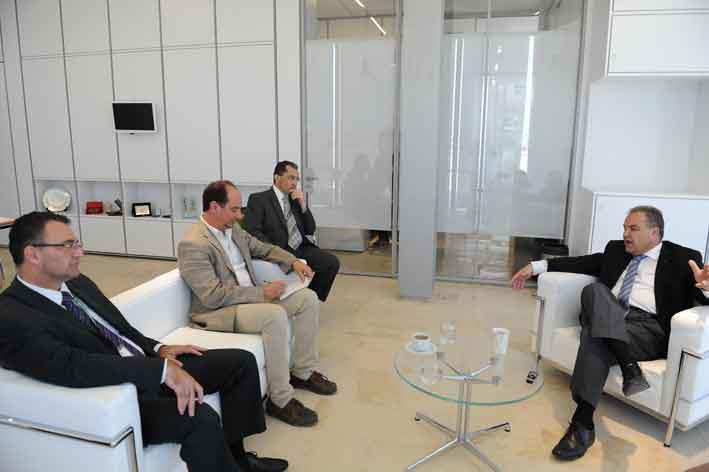
MPs’ behaviour is more visible than ever
Turning to televised and live-streamed plenary sessions, he described it as helping to create constant transparency.
The Speaker clarified that MPs’ behaviour is now more visible than before.
“The public following on TV is incredible. I’ve received a number of emails from people who are unable to watch at the moment as they are not package subscribers. Pensioners for example, don’t have €30 or €40 a month to subscribe to a particular company. Why shouldn’t they be able to follow the highest institution of the land? The PN and PL have their own stations and commercial companies have their own Parliamentary channel… and Parliament itself, now, should have its own Parliamentary channel that would be aired free for everyone”.
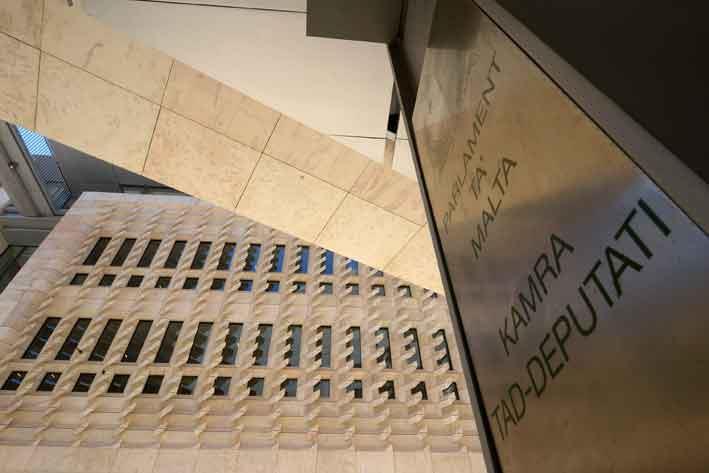
The Speaker explained that when a Committee meets at the same time as a Plenary session, the Committee meeting will be aired at the first opportunity the next day.
Discussions have already kicked off with the Broadcasting Authority over a possible Parliamentary run channel, he said, “yet the law can sometimes be problematic. The law states that licenses can only be issued to a company or a political entity… and Parliament is above that. This will need to be discussed in the House Business Committee in order to find a solution, through a possible amendment”.
Turning to operations within the Chamber, Dr Farrugia explained that until now, the camera focusses solely on the person speaking, bar in certain situations. “This is a good start, But when you see Parliamentarians misbehaving, the Speaker should have the ability to change the camera view onto those Parliamentarians prior to the delivered reprimand. Why should this be allowed? Because its part of the discipline in the House. It’s something we need to discuss”.
The Clerk of the House has also improved the online services, by publishing papers laid online on the Parliamentary website, “just a few hours after they are tabled in Parliament,” the Speaker added.
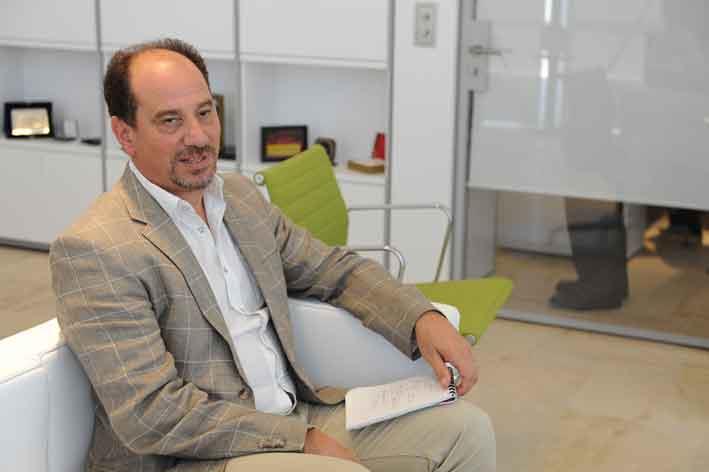
The whips
Labour Whip Godfrey Farrugia believes that to a certain extent the media have been bypassed by “going directly to the roots of society”. Previously we had a Parliament where only the Committees were streamed live, and now everything that happens in Parliament is televised”.
David Agius believes a Parliament TV Channel was a good idea, adding that a basic free-to-air TV channel for everyone is a must. “I don’t know what is keeping government from giving us, as Parliament, this channel. I think that is the next step to completing the communications aspect of it all”.
Mr Agius expressed his hope that Parliamentarians have realised that they are now live on television. “Today, if I am delivering a speech and those behind me are talking between themselves, like used to happen in the past, people at home can see this, and text them to asking why they are doing this”.
Mr Agius has a rather interesting idea, and has spoken to the Speaker about its implementation.
He wants to introduce a Parliament Twitter account, where when Parliament takes a vote it can be shared via this social media.
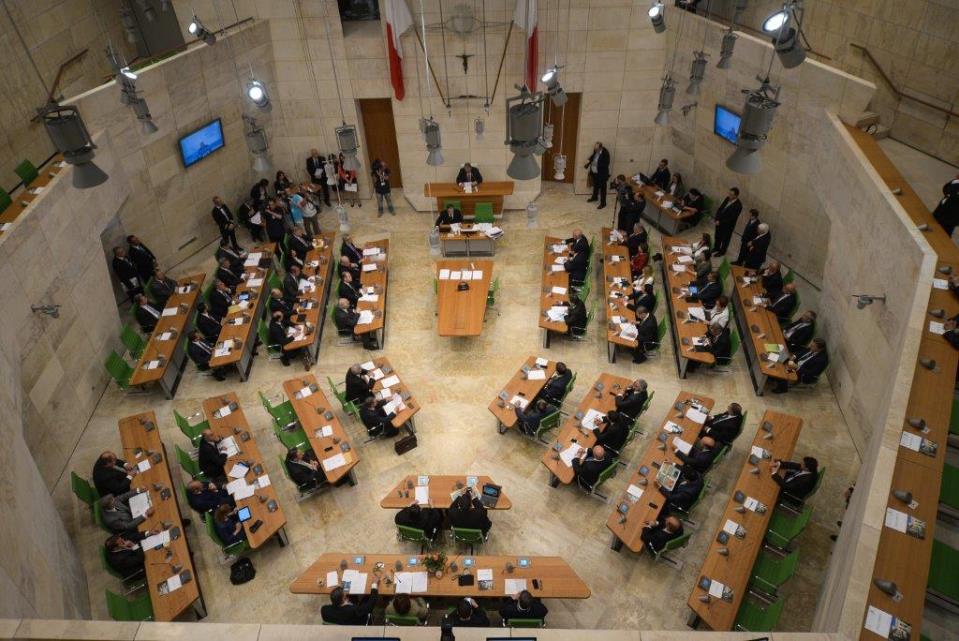
Space concerns
As for complaints about limited space, the Speaker argues that the House is spacious enough. “meeting rooms can be utilised on rotation. If one goes to the European Parliament, there are specific rooms that need to be booked. Currently, we have three Committee rooms, with a possibility of a fourth in the future in Level -2, which is not yet complete. Aside from this, Level -2 will see an archive, library and a bar”.
Labour Whip Godfrey Farrugia does see the lack of space as an issue. “As a Whip, there is plenty of running between the two buildings, up and down the stairs,” he quipped.
When it comes to Ministerial or Parliamentary Secretary offices, “We have arranged a rotation where the Parliamentary Secretaries share the offices. Thanks to the lack of space, We have introduced a roster for the first time, ensuring that we have 16 individuals present in Parliament all the time, so something positive did come out of it”. He said that this ensures that there is always a Parliamentary quorum.
“If we had to have a session that would last the whole day, such as budget day, it would prove difficult to organise a Cabinet meeting in the new Parliament,” he said. “The openness of the offices means that there is a lack of privacy, especially when it comes to noise. Otherwise I would say the members are well oriented with the building and are more than pleased with the facilities”. The PL Whip held that It is still a learning process.
“The advantage of this Parliament is that its open, allowing for transparency. I know the Speaker has a number of innovative ideas whereby the Parliament will be the peoples’ owned Parliament”.
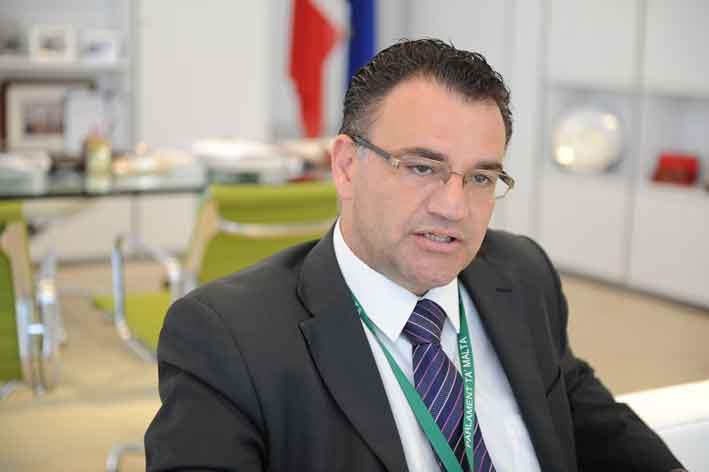
PN David Agius argued that the new Parliament was something planned by the PN. “There was no consensus in the past, however now we are working here and it is a workable building. We have our room, given to us by the Speaker, which we have improved and made more accessible for our MPs. All we need is one more room to complete it. Otherwise we have everything we would require as the Opposition here”.
He explained that some PN MPs are using the offices provided in Parliament more than before, due to the larger space available for the Opposition. The Opposition Leader is using his office in Parliament much more frequently than before, Mr Agius said. He has also organised visits for people to the building and MPs have invited their constituents to do the same”.
With regards to the Chamber, the only visible difference today is that “we can better hear what is being said. This caught most of us off guard, as if someone passes a comment the person opposite will hear and understand what was said. The comments we used to pass between us now tend to become an issue, and this is what triggered some of the sparks in Parliament recently. Otherwise it’s a positive experience”.
He agreed that it is still a learning process for MPs.
Parliament is slowly moving away from the traditional Monday to Wednesday 6pm to 9pm mentality, the PN Whip claimed. “We have seen some Committee meetings start at 9am, and on days when there is no plenary session”.
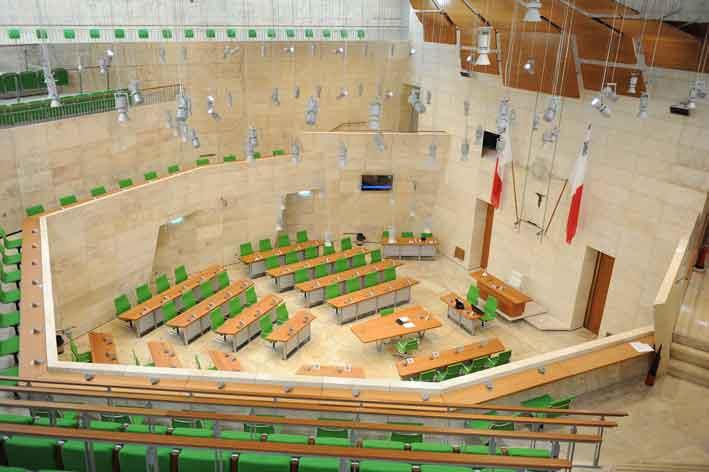
A citizen’s remedy
Speaker Anglu Farrugia intends to push for a citizen’s remedy for abuse of Parliamentary privilege.
“We should be the first country in Europe to introduce it. There are models in New Zealand and Canada where a citizen can seek a remedy against any member of Parliament, making them responsible for what they say. They have a right to enjoy Parliamentary privilege, but must not abuse it”.
Is security still a concern?
The Speaker could not stress the importance of the issue enough. “You would only need one incident to result in a life of regret. Parliament is the ideal target for a terrorist who believes in going against the system”.
As such, the Speaker spoke of discussions taking place regarding inserting bollards where access from Ordinance street and Castille would be “practically impossible… it would be under our control. But of course this would need to be organised”. He expressed the need to enhance the security around the building, and admitted that it is costly.
“Security is part of the Parliamentary Democracy system”.
PN Whip David Agius jumped in and explained that he is not as worried about security. Mr Agius believes that a terror attack, if one were to take place, would be less likely to take place near a protected building, but rather in an area where the everyday Joe is undergoing his day-to-day activities.
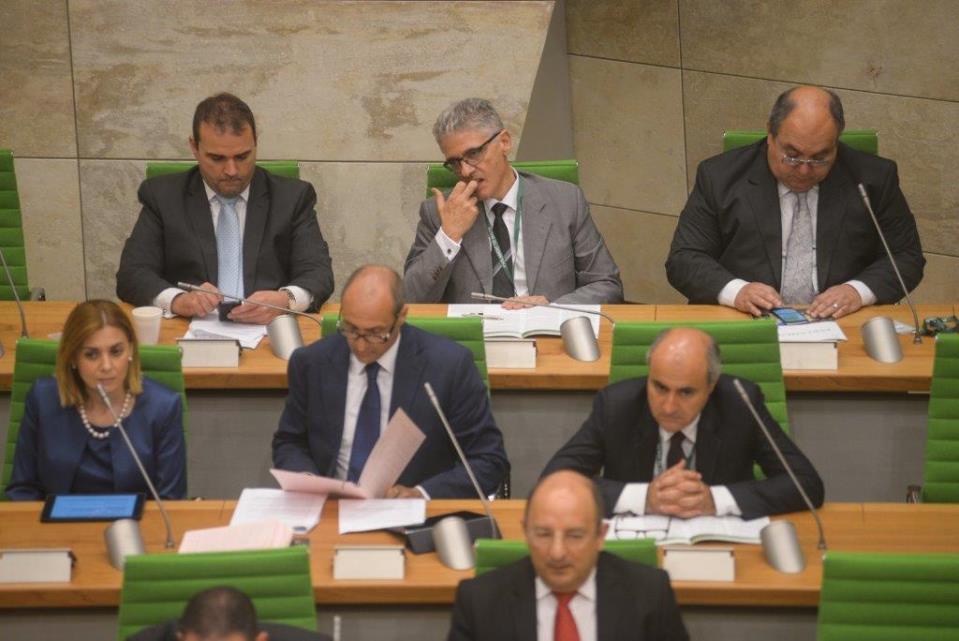
Godfrey Farrugia believes that the building is very exposed and insists on the importance of ensuring the security of Parliament. He explained that there does not necessarily need to be a human casualty for a situation to be disastrous, as if one had to spray paint part of a wall would be symbolic, and it must be avoided. Apart from Parliament holding MPs, a number of foreign dignitaries also visit. He mentioned that if a person with ill-intent enters the stranger’s gallery to divert the attention of the media, it would be quite easily done.
The PL Whip explains that in the old Parliament, there was more interaction between the MPs, the media and the public. “This is something that is missing in the new Parliament. Although we have a Parliament that goes to the root of society in real time, if we are not careful we will lose that one-to-one relationship with the media who are now seated in the gallery above us. It is harder for MPs and the media to contact each other for man-to-man talks in Parliament”.
He envisages a few problems with the next budget session, with particular problems in relation to the seating of technical persons. On this point, the Speaker said that Parliament must adapt, and mentioned that there are 6 seats available for such experts.
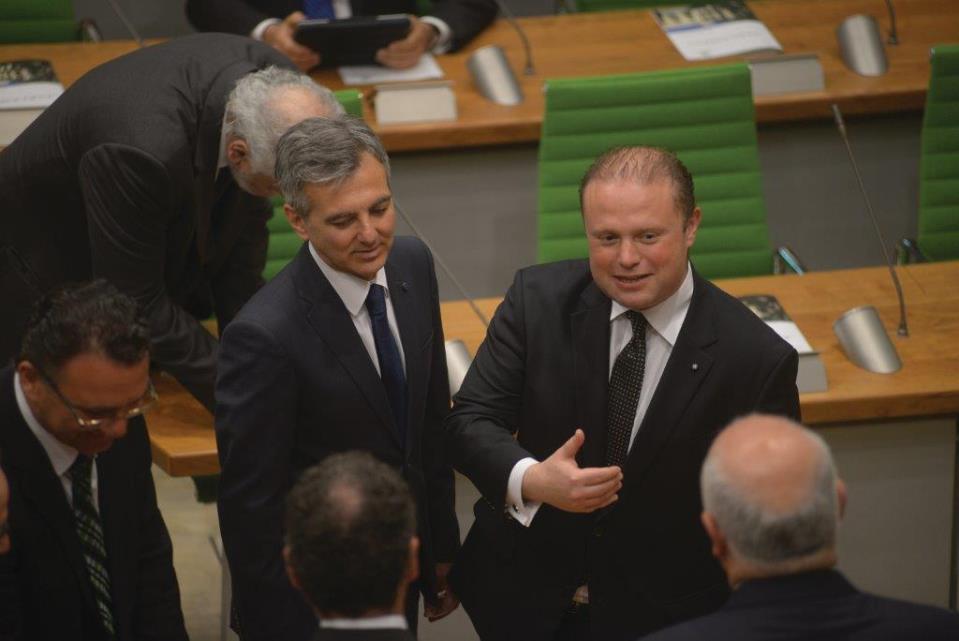
Why should there be a dress code?
Asked about dress codes and codes of conduct, Dr Godfrey Farrugia asked – “why should there be dress codes? I am one of those MPs who comes to Parliament in comfortable clothes. There have been fellow MPs who have remarked at the unconventional way I attend Parliament. I still wear a jacket, but I may not wear the tie or a collared shirt. Personally I don’t feel that Parliament should be a gala occasion. One should feel free to attend, smartly dressed, utilising a dress code fitting to our daily lives”.
Dr Agius believes it is everyone’s decision as to how they choose to dress in Parliament.” Obviously he would be responsible for his or her own dress code, and the constituents… the voters will decide. If they like the way that person behaves, argues and dresses, it is up to the Maltese voters to judge us. Today more-so than ever, since they can both see and hear us.”
The Speaker explained that according to the Standing Orders, there is no dress code, however “personally I feel that the institution should be respected. Yes one must wear comfortable clothes, however I would not agree that an MP would wear shorts for example. If you go to the Courts and present yourself before the judge you would not need a white coloured shirt, but at least you would wear a jacket. These are elected representatives of the people… I don’t believe that all Parliamentarians must wear a tie, and they can go with the Tsipras model with an open shirt, however at least it must only include a single open button, and not be open all the way down”.
Anglu Farrugia stressed that the Prime Minister and Ministers are judged by the public on their conduct.

“Parliamentarians should dress decently, be prepared and take care of what they say. Although we don’t have a dress code we should voluntarily work on this”.
Stepping in, PL Whip Farrugia joked that “the only dress-code we have is that we aren’t allowed to wear a hat”. He also expressed his wish for a Parliamentary session to take place in Gozo.
Currently there are 46 members of staff working within the new Parliament, which include research assistants. Dr Godfrey Farrugia, who is head of delegation for the Organisation for Security and Co-operation in Europe (OSCE), now has a research analyst who helped him “pave the way forward” in terms of research in relation to co-sponsoring a number of international resolutions as Parliamentarians, and also helped to analyse the international situation in order to identify where Malta’s local situation fits in”.
“Previously I used to attend single-handed however now I have backup, who help me identify the most important issues”.
Curator for exhibition space
Turning to the use of the Parliamentary foyer within Parliament, the Speaker explained that Parliament is the peoples’ house, and thus have to give everyone a chance. ”Should we have a curator, yes. In the meantime until we hire one, the Clerk and I put together an internal committee of three people who organise the exhibitions with the artists themselves”.
“We have to give small-time as well as famous artists the chance to utilise this building. We have already kicked off discussions with the Chairman of Heritage Malta and with the Malta Arts Committee to sort out the curator situation”.
“Parliament will not be conditioned by those who believe that the Renzo Piano building should only be used by those who believe themselves culture gurus”.
David Agius believes that this was a good start, however “in art and culture standards exist, and we as politicians… and as Parliament must also respect that”. Mr Agius approves of having a curator who would be agreed upon within the House Business Committee. He explained that it must be someone they have confidence in who can choose a mixture of new talent and established artists. He stressed that Parliament must improve the system, by giving due respect to everyone while also not excluding anyone.